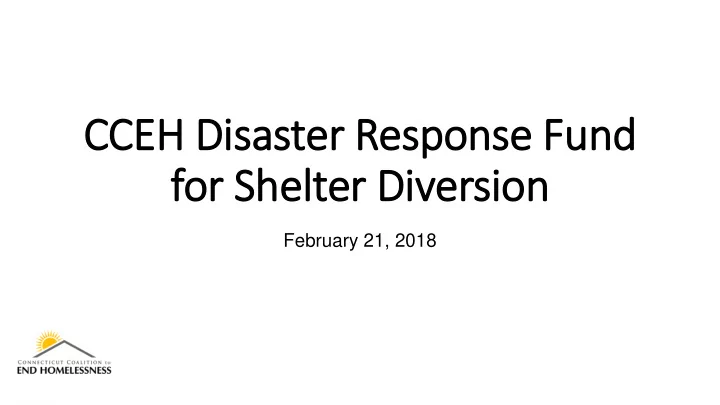

CCEH CCEH Disaster R Response Fu Fund for r Shelt lter D r Diversio ion February 21, 2018
Who are we? Lisa Tepper Bates Brian Roccapriore Executive Director Director of HMIS & Strategic Analysis Connecticut Coalition to End Connecticut Coalition to End Homelessness Homelessness ltbates@cceh.org broccapriore@cceh.org
Agenda for the Webinar 1. Introduction 2. Connecticut disaster case management 3. Eligible clients 4. Shelter Diversion approach 5. Submitting Assistance Requests 6. Q&A session
Hurricane Survivors in CT: Assessment of Need Estimates of total people range from 3,500-5,000 Estimates are based on: 1,056 FEMA Registrants 2,391 people in FEMA registered households 1,846 school enrollments (as of 2/2/18 based on 69 LEAs) 3,595 calls handled by 2-1-1 (9/22/17-2/5/18)
Support For Hurricane Survivors • State • Municipalities • Governor’s Office • School Districts • Department of Emergency • Chief Elected Officials Management and Homeland • Emergency Management Directors Security • Social Services • Department of Housing • Department of Social Services • Other Agencies Many Have Worked to Help Hurricane Survivors • Nonprofits • Disaster Case Management Agencies • CT Coalition to End • Salvation Army Homelessness • Catholic Charities • United Way/2-1-1 • Community Action Agencies • Red Cross • Community Leaders • Welcome Centers (Junta, CREC, Bridgeport/Career Resources, New Britain, Waterbury) • Faith Communities • Many others
Immediate Critical Needs Housing Disaster Case Management Disaster Case Management Criteria: • Homeless or at immediate risk of homelessness • FEMA hotel placement (TSA) household • Medical or special need • Ineligible for FEMA assistance, with critical need Disaster Case Management Referrals Organization Location of Service Salvation Army Hartford, New Haven, Waterbury Hartford, New Haven, Waterbury Catholic Charities CAP Agencies Balance of State
Shelter Diversion Approach Shelter Diversion is a strategy that prevents homelessness by helping people identify immediate alternate housing arrangements and, if necessary, connecting them with services and financial assistance to help them maintain/return to permanent housing. • CCEH Shelter Diversion training is based on the innovative work of Ed Boyte from the Cleveland Mediation Center, and centers on a strengths-based approach to helping clients identify and access housing options • Connecticut has had good success in reducing homelessness through shelter diversion
Shelter Diversion Training CCEH has guaranteed grantors who support the Disaster Response Fund that access to this fund will be available only to DCMs trained in the shelter diversion approach • Special training for Disaster Case Managers: CCEH will provide a specific training for Disaster Case Managers in early March TBD at our office (257 Lawrence St., Hartford) • Regular trainings offered every month by CCEH in conjunction with the Department of Housing (information at the CCEH website)
Allowable Emergency Financial Assistance Costs Allowable costs include payments made to third parties (not paid directly to the client OR to the DCM’s agency) for: • Security deposit, first month’s rent • Limited-time subsidy of rent for evacuees staying with relatives • Utility payment for relatives housing evacuees • Similar costs that can preserve existing housing or help to secure new housing as needed (Rental Arrearage, Moving Cost Assistance, Rental Application Fees, Childcare expenses, etc.)
Additional Considerations for Emergency Financial Assistance Costs • W-9 : for security deposit, rental payments, or childcare payments over $600 DCM must attach the W-9 for the payee • Exception to third-party payee rule for transportation : CCEH will reimburse to the DCM’s agency costs associated with evacuee travel to return home/move to a location where there is a viable housing option (this can include costs of airfare, train, bus or other transportation)
Submitting Assistance Requests Each DCM will receive a link to the online portal to request client funds. DCM must create an account in Smartsheets (a secure, online service) • DCMs will be able immediately to begin requesting funds for disaster survivors after creating their own unique accounts. • Example.
Questions / Concerns Contact info: Lisa Tepper Bates Brian Roccapriore 860.721.7876 x103 860.721.7876 x110 ltbates@cceh.org broccapriore@cceh.org Resources: CCEH Disaster Response Resources: www.cceh.org/disaster 12
Recommend
More recommend